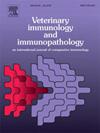通过靶向突变设计fc惰性猫IgG1:应用于抗pd -1抗体的开发。
IF 1.4
3区 农林科学
Q4 IMMUNOLOGY
引用次数: 0
摘要
免疫检查点抑制剂(ICIs)已经彻底改变了人类的癌症治疗;然而,对ICIs在猫中的研究仍然有限,并且尚未对猫肿瘤疾病进行临床试验。本研究开发了一种针对猫PD-1分子的小鼠单克隆抗体(克隆1A1-2),并将1A1-2的恒定区替换为猫IgG1的恒定区,生成了小鼠-猫嵌合抗体(1A1-2- figg1)。然而,猫服用1A1-2-fIgG1可能会通过补体依赖性细胞毒性、抗体依赖性细胞介导的细胞毒性和抗体依赖性细胞吞噬作用消耗表达pd -1的效应t细胞,因为猫的IgG1与CD64、CD16和C1q结合。我们设计了两个1A1-2-fIgG1突变体,在恒定区域进行氨基酸替换,以减少Fc片段与C1q或Fcγ rs之间的相互作用,并减轻这些效应功能。这些突变成功地消除了与CD64、CD32和CD16的结合,同时保留了对FcRn的亲和力,这对于维持血液中抗体的半衰期至关重要。此外,突变体表现出与C1q的结合受损。尽管有这些修饰,突变抗体有效地恢复了受刺激淋巴细胞中PD-1/PD-L1信号抑制的IFN-γ产生,使其达到与原始抗体相当的水平。这些发现表明,工程抗体在未来的临床应用中具有潜在的猫肿瘤。本文章由计算机程序翻译,如有差异,请以英文原文为准。
Engineering an Fc-inert feline IgG1 by targeted mutations: Application to anti-PD-1 antibody development
Immune checkpoint inhibitors (ICIs) have revolutionized cancer treatment in humans; however, research on ICIs in cats remains limited, and no clinical trials have been conducted for feline neoplastic diseases. Here, we developed a mouse monoclonal antibody (clone 1A1–2) targeting the feline PD-1 molecule and generated a mouse-feline chimeric antibody (1A1–2-fIgG1) by replacing the constant region of 1A1–2 with that of feline IgG1. However, administering 1A1–2-fIgG1 to cats may deplete PD-1-expressing effector T-cells via complement-dependent cytotoxicity, antibody-dependent cell-mediated cytotoxicity, and antibody-dependent cellular phagocytosis, as feline IgG1 binds to CD64, CD16, and C1q. We engineered two 1A1–2-fIgG1 mutants with amino acid substitutions in the constant region to reduce the interactions between the Fc fragment and C1q or FcγRs and mitigate these effector functions. These mutations successfully abolished the binding to CD64, CD32, and CD16 while preserving the affinity for FcRn, which is essential in maintaining the half-life of antibodies in the blood. Furthermore, the mutants exhibited impaired binding to C1q. Despite these modifications, the mutated antibodies effectively restored IFN-γ production, which had been suppressed by PD-1/PD-L1 signaling in stimulated lymphocytes, to levels comparable to those of the original antibody. These findings reveal that the engineered antibodies have potential for future clinical applications in feline oncology.
求助全文
通过发布文献求助,成功后即可免费获取论文全文。
去求助
来源期刊
CiteScore
3.40
自引率
5.60%
发文量
79
审稿时长
70 days
期刊介绍:
The journal reports basic, comparative and clinical immunology as they pertain to the animal species designated here: livestock, poultry, and fish species that are major food animals and companion animals such as cats, dogs, horses and camels, and wildlife species that act as reservoirs for food, companion or human infectious diseases, or as models for human disease.
Rodent models of infectious diseases that are of importance in the animal species indicated above,when the disease requires a level of containment that is not readily available for larger animal experimentation (ABSL3), will be considered. Papers on rabbits, lizards, guinea pigs, badgers, armadillos, elephants, antelope, and buffalo will be reviewed if the research advances our fundamental understanding of immunology, or if they act as a reservoir of infectious disease for the primary animal species designated above, or for humans. Manuscripts employing other species will be reviewed if justified as fitting into the categories above.
The following topics are appropriate: biology of cells and mechanisms of the immune system, immunochemistry, immunodeficiencies, immunodiagnosis, immunogenetics, immunopathology, immunology of infectious disease and tumors, immunoprophylaxis including vaccine development and delivery, immunological aspects of pregnancy including passive immunity, autoimmuity, neuroimmunology, and transplanatation immunology. Manuscripts that describe new genes and development of tools such as monoclonal antibodies are also of interest when part of a larger biological study. Studies employing extracts or constituents (plant extracts, feed additives or microbiome) must be sufficiently defined to be reproduced in other laboratories and also provide evidence for possible mechanisms and not simply show an effect on the immune system.

 求助内容:
求助内容: 应助结果提醒方式:
应助结果提醒方式:


